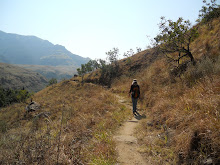 ‘your letter is delightful, larger and lighter
‘your letter is delightful, larger and lighterthan thoughts of a flower when the dream
is the earth of the garden,
...
I fled to your letter, to read
that the small orange tree is a mass of white blossoms
opening with the sun,
...
as your letter opens
there is an unfolding of sky, of word from the outside’
(Extract taken from ‘Your Letter Is Delightful’, Breyten Breytenbach 1984, The True Confessions of an Albino Terrorist, Emmarentia, Jhb: Taurus, p 348. Photograph, by Philip de Vos, scanned from the back cover of my copy of Dog Heart)
In Standard Five, our class teacher – the woman who led us through each day – was also our Afrikaans teacher. She was the closest thing to a witch I’ve ever encountered, in looks and in manner. She scared us to death. For many years, I disliked that language intensely. It sounded so harsh, and though I didn't articulate the thought at the time, looking back the main things it seemed to express were disdain and cynicism, weariness and impatience. But then sometime in the late 90s I chanced upon a TV documentary on Breyten Breytenbach, in which he slides from English into Afrikaans and back again (as he also does here), and suddenly Afrikaans sounded wonderful – warm and courteous, at once mysterious and graspable. Since then, two friends have confirmed the impression.
Without Breytenbach (also without my two friends and one or two of the other Afrikaans-speaking people I’ve chatted with), I wouldn't have been able to enjoy the humour or the whimsy or the colloquial flavour of phrases like ’n helse fout and ’n engel uit die blou hemel (funnily enough both uttered by chefs in two issues of Taste), the latter of which Breytenbach seems to have had in mind too, for when ‘the showers abate and heavens suddenly expose a silk-blue underlayer’, the narrator of Dog Heart sees ‘angels walking hither and thither up there’ (Breyten Breytenbach 1998, Dog Heart, Cape Town: Human & Rousseau, p 105).
Without Breytenbach (also without my two friends and one or two of the other Afrikaans-speaking people I’ve chatted with), I wouldn't have been able to enjoy the humour or the whimsy or the colloquial flavour of phrases like ’n helse fout and ’n engel uit die blou hemel (funnily enough both uttered by chefs in two issues of Taste), the latter of which Breytenbach seems to have had in mind too, for when ‘the showers abate and heavens suddenly expose a silk-blue underlayer’, the narrator of Dog Heart sees ‘angels walking hither and thither up there’ (Breyten Breytenbach 1998, Dog Heart, Cape Town: Human & Rousseau, p 105).
And without him, we would have the pleasure neither of thought-provoking ideas like 'When a language dies, the dead die twice', nor of poems such as the above-quoted one. There are many things to appreciate in that poem in print, but perhaps it achieves its full impact when spoken, as Breytenbach does here.
He’ll be launching his new book of essays, Notes from the Middle World, at Boekehuis, Auckland Park next week, 4 March, at 6:00. There’s also an interview with him about this book here.


thank you for your kind comments on my blog! they make me so happy!
ReplyDeletehave a great weekend :)
I'm back again - thank you so much for your support!
ReplyDeleteAll the best!